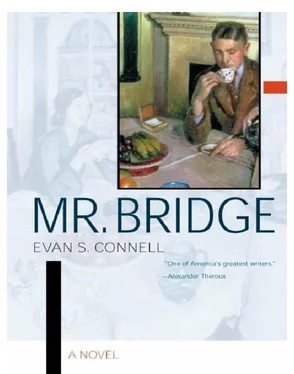“She had a pony,” Hager blurted, and gave Mr. Bridge a stark, desperate look.
Mrs. Bridge, more bewildered than ever, shook her head helplessly. Hager tugged his beard and rolled his eyes.
“Let’s get that cognac,” said Mr. Bridge.
Mrs. Bridge stamped her foot. “Both of you stop right where you are. I insist on knowing what this is all about. Morgan, why did she have a pony? Did she like to ride?”
Hager said breathlessly, “I don’t know, she had an Alsatian dog, too. Listen, I’ve got to be going. I’m late. I got to meet somebody. Good night. It was sure swell meeting both of you. Good night.” He was backing away.
Mr. Bridge nodded. “Good night, Morgan.”
Mrs. Bridge was completely confused. “If you’re late, Morgan, we certainly won’t keep you. But—”
Hager was nearly staggering in his haste to get away. “Good night! Good night!” he cried.
“Good night, Morgan,” she answered, waving to him. “It’s been awfully nice. We enjoyed the evening so much.” She was still waving to him with a bewildered and hurt expression when he turned the corner.
The next day they got off to an early start and by noon had visited Montmartre and the church of Sacré Coeur, been to the top of Notre Dame, and spent several minutes in the Invalides peering down at Napoleon’s tomb. Then after a ride to the top of the Eiffel Tower and a tasty luncheon of lobster and chilled white wine they proceeded to the Louvre. Mrs. Bridge had been looking forward to this. First on her list were the Mona Lisa, the Venus de Milo, and the Winged Victory of Samothrace. They located the first two without much difficulty. But after wandering about for some time in search of the Winged Victory, meanwhile stopping to inspect vases, tapestries, paintings, mummies, and other relics, Mr. Bridge proposed to wait outside while she continued through the Louvre alone. The Louvre held an impressive and invaluable collection, but in London they had spent almost three hours at the National Gallery, to say nothing of five or six other galleries and museums, and there were more coming up in Florence and Rome. Enough was enough.
So he left her in the corridor beneath an enormous painting of some half-naked people struggling on a raft, picked up the camera from the entrance where he had checked it, and went outside and sat down on a bench in the shade of a tree. The day was very hot. He took off his linen coat and folded it across his lap. He observed the French children in blue smocks playing with hoops and balloons, old women knitting and chatting, and he felt pleased with the trip so far. He considered what they had done and thought about what was next on the itinerary. The Riviera. Italy. Switzerland. Then home again. Germany and Spain, unfortunately, must be excluded. Maybe in another few years when the children were grown and these countries stabilized themselves a more comprehensive tour would be feasible. He thought about the children, about Harriet’s drinking, and the work at the office. He thought of sending a wire to Julia to find out if everything was in order. But she had a copy of the itinerary and she was sensible. She would be in touch if necessary. He thought again of how important this trip was for his wife. He had felt the emotion she herself felt at the first sight of Notre Dame. This moment alone was worth the expense, the preparation, and all the annoyance of travel. He reflected that they should have done more traveling. However, there was still time. In the years to come they would visit other countries. The Orient. The Middle East. When it was not so difficult they might arrange to see Petra.
Finally she emerged from the Louvre and he knew at once that it had been everything she hoped. He asked what she wanted to do next and she wondered if they might walk around awhile in St. Germain, which they had not visited because of Morgan Hager’s extraordinary disappearance. He doubted if there was much in St. Germain except some more Bohemian artists, and they had encountered plenty of those the previous night; however if that was where she wished to go that was where they would go.
He flagged another taxi. They rode across the Seine, got out of the taxi and walked around, and finally they settled in a café to rest and discuss what they had seen.
Presently a little girl about nine or ten years old stopped at the table and held out her hand. She was dressed in a rag and did not have any shoes. Her face was streaked with dirt. She had been crying. She stood beside the table, her eyes fastened on Mr. Bridge, and she murmured, “Monsieur, j’ai faim.”
He reached into his pocket for a coin. Then he paused without knowing why, and he exclaimed harshly: “Go away! Go away, child! Get away from this table.”
The little girl coughed. In her soft, pleading voice she repeated, “J’ai faim.”
He waved at her. “Off! Off! Allez-vous!” he cried, brushing at her. “You may as well leave right now, because I will not give you one red cent. Not one cent will you get from me, do you understand?”
“J’ai faim. S’il vous plait, monsieur,” she whimpered. She wiped her nose. She coughed again. Her beseeching eyes stuck to him.
Mrs. Bridge said, “Walter! For Heaven’s sake!”
“You let me handle this,” he replied. He shook his finger at the child. “Allez-vous vite! Run away, child. You will get nothing here. Go away!”
“J’ai faim,” whispered the little girl, and clutched her stomach in case he did not quite understand French.
He gestured furiously because she was attempting to humiliate him. “Leave us alone,” he said, aiming his index finger straight between her eyes, “or I will send for the police. The police. Comprenez-vous?”
She pretended that she did not, but he was sure she did. Very sadly she wandered away.
“Oh, Walter,” Mrs. Bridge gasped after the child was gone. “I know how you feel about giving to people in the street, but goodness, there are exceptions! I haven’t been so embarrassed since I don’t know when.”
“That child was attempting to take advantage of the fact that we are tourists,” he said, and he was still angered. “The waiter should not have allowed her to molest us. Nor was she begging, she was demanding. I will not be coerced. I contribute a reasonable percentage of what I earn each year to various charities. In addition, I do occasionally give money to street beggars. However, I refuse to be taken advantage of. That is all there is to it. The subject is closed.”
He knew she was ashamed of him, and it was an unpleasant way to end the afternoon, but he did not see how he could have behaved differently.
Half an hour later they left the café to return to the hotel. They stood on the corner while he waved at taxis, but it was the rush hour and none would stop. They decided to walk a few blocks toward the hotel in the hope of catching one along the way, and as they crossed a narrow side street opening into the boulevard he caught her arm and pointed. On the curb with her feet in the gutter sat the little girl. She was not coughing and crying, she was counting money, stacking coins in neat rows with the casual ease of a professional. She was a fake who preyed on tourists, there was no doubt about it. She had several dollars’ worth of francs.
“I thought so!” he remarked to his wife as they continued along the boulevard. “Something told me to beware of that child. I was suspicious right from the start.”
He had frequently reminded her that in Paris the one thing they were going to see if they saw nothing else was a cancan. He always laughed when he said this, while she, pretending to be somewhat scandalized, always protested but ended by saying that if he was determined to go she certainly intended to go along as a chaperone.
Читать дальше












